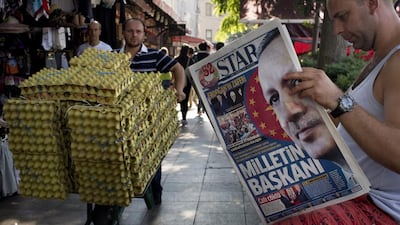ANKARA // Turkey’s prime minister, Recep Tayyip Erdogan, promised the start of a new era after winning presidential elections in an easy triumph, despite fears that the country is creeping towards one-man rule.
With Turkey still deeply polarised after last year’s bitter protests, Mr Erdogan has vowed to shake up Turkey’s political system to make the president its paramount figure.
He won 52 per cent in Sunday’s vote, according to a count of 99 per cent of ballots. His main opposition rival, Ekmeleddin Ihsanoglu, received 38.3 per cent, meaning there will be no second round.
The third contender, Kurdish candidate Selahattin Demirtas, won 9.7 per cent of the vote. Mr Erdogan’s inauguration is set for August 28.
The result marked a personal triumph for Mr Erdogan, 60, who has served as premier since 2003 and could be president for two mandates, until 2024.
Thousands of people filled central Istanbul waving Turkish flags and holding pictures of Mr Erdogan to celebrate his victory as fireworks lit up the sky over the capital Ankara.
“Today we are closing an era and taking the first step for a new era,” Mr Erdogan said in his victory speech from the balcony of his party headquarters in Ankara, describing the election as a historic day.
“It is not only Recep Tayyip Erdogan who won today. Today, national will has won once again. Today, democracy has won once again.”
Mr Erdogan promised a “new social reconciliation process” where all Turks of whatever origin or belief would be equal citizens of the country.
“I will be a president who wholeheartedly embraces 77 million people, as I have done all through my life and all through my political struggle,” he said.
Mr Erdogan also called on opponents who label him a dictator to question themselves instead of criticising him.
The political opposition should review their policies to overlap with his “new Turkey” ideal, he said. “Those who accuse us of one-man rule should please question themselves sincerely,” he said.
The polls were the first time that Turkey – a member of Nato and long-time hopeful to join the European Union – has directly elected its president, who was previously chosen by parliament.
Mr Erdogan had hoped for a massive show of popular support.
The president-elect has said he plans to revamp the post to give the president greater executive powers, which could result in Turkey shifting towards a political system more like that of France if his Justice and Development Party (AKP) succeeds in changing the constitution.
But Mr Erdogan’s opponents accuse him of undermining the secular legacy of Turkey’s founding father, Mustafa Kemal Ataturk, who established a strict separation between religion and politics when he forged the new state from the ashes of the Ottoman empire.
“It is not Ihsanoglu who lost the elections, but the longing for clean and honest politics and a quest for democracy,” said Haluk Koc, a spokesman for the Republican People’s Party that backed Mr Ihsanoglu, denouncing Mr Erdogan’s “oppressive mindset”.
”While many secular Turks detest Erdogan, he can still count on a huge base of support from religiously conservative middle-income voters, particularly in central Turkey and poorer districts of Istanbul, who have prospered under his rule.”
Regional breakdowns of the electoral results showed a clear geographical polarisation in the country, with Mr Ihsanoglu taking the strongly secular western coast.
Mr Erdogan endured the toughest year of his rule last year, shaken by deadly mass protests sparked by plans to build a shopping mall in Gezi Park, one of the last green spaces in central Istanbul, which grew into a general cry of anger by secular Turks who felt ignored by the AKP. Meanwhile, the departing president, Abdullah Gul, said on Monday that he would return to the AKP after he handed over the post of head of state to Mr Erdogan.
As president, Mr Gul has had to sever all links with the AKP – in accordance with the law – which he helped to co-found with Mr Erdogan in 2001.
Mr Gul’s comment that he intends to return to the ranks of the party will probably intensify speculation that he may be considered a possible candidate to take over as prime minister.
“I am president until August 28, and after this it is only natural for me to return to my party,” said Mr Gul.
“I have no doubt that I will return to my party.”
* Agence France-Presse

